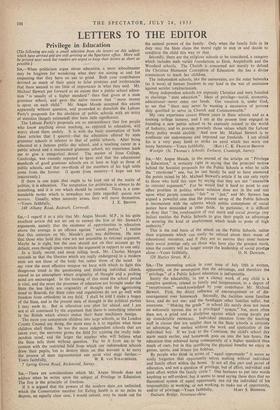Snt,—Mr. Angus Maude, in the second of the articles on
" Privilege in Education," is certainly right in saying that the principal motive behind the Socialist proposals for the Public Schools is what he calls the " emotional " one, but he can hardly be said to have answered the points raised by Mr. Michael Stewart's article if he can only reply to those who hold this view by saying that they are not " amenable to rational argument." For he would find it hard to point to any other problem in politics whose solution does not in the end rest upon what people consider " fair " or " just," and Mr. Stewart has argued a powerful case that the present set-up of the Public Schools is inconsistent with the reforms which public conceptions of social justice have demanded in other fields. In particular, it is difficult to deny that " the, combination of real merit and social prestige (my italics) enables the Public Schools to give their pupils an advantage in securing the kind of employment which leads to posts of high authority."
This is the real basis of the attack on the Public Schools, rather than arguments which can easily be refuted about their waste of educational resources, and if they are to survive they must bestow their social prestige only on those who have also the greatest merit, since the country will no longer accept the leadership of social prestige


























 Previous page
Previous page